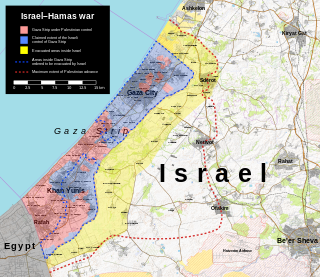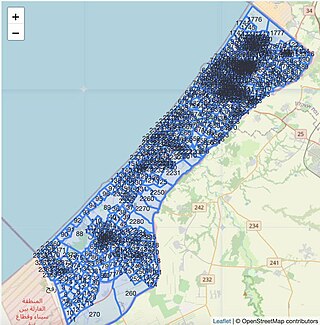The year 2023 in Israel was defined first by wide-scale protests against a proposed judicial reform, and then by the Hamas-led attack on Israel on October 7, which led to a war and to Israel invading the Gaza Strip.

An armed conflict between Israel and Hamas-led Palestinian militant groups has been taking place in the Gaza Strip and Israel since 7 October 2023. It is the fifth war of the Gaza–Israel conflict since 2008, and the most significant military engagement in the region since the Yom Kippur War in 1973. It is the deadliest war for Palestinians in the history of the Israeli–Palestinian conflict.

Israel and the Lebanese militant group Hezbollah started exchanging fire along the Israel–Lebanon border and in the Israeli-occupied Golan Heights starting 8 October 2023. Israel also carried out airstrikes throughout Lebanon and in Syria. The clashes were part of the spillover of the Israel–Hamas war and the largest escalation of the Hezbollah–Israel conflict since the 2006 Lebanon War. On September 30, 2024, Israel escalated the conflict into a ground invasion of Lebanon.

During the Israel–Hamas war, the Israeli military ordered mass evacuations in Gaza, resulting in one of the largest displacements of Palestinians since 1948. On 13 October 2023, just one week after Hamas' attack on Israel, Israel instructed 1.1 million Gazans north of the Wadi Gaza, including those in Gaza City, to evacuate within 24 hours. This evacuation triggered a humanitarian crisis, with Palestinians calling it the "second Nakba," in reference to the mass displacement of 1948.
Events of the year 2024 in Israel.
Events in the year 2024 in Lebanon.
The following is a list of events during the Israeli–Palestinian conflict in 2024, including the events of the Israel–Hamas war.

The Middle Eastern crisis is a series of interrelated conflicts and heightened instability in the Middle East which began with the Hamas-led attack on Israel on 7 October 2023 and the war that followed, leading to a major escalation of the existing tensions between Israel and Iran. This has resulted in several proxy conflicts breaking out across the Middle East involving both sides, such as Red Sea crisis and the 2024 Israeli invasion of Lebanon.

Since the beginning of the Israel–Hamas war in 2023, the Israeli military and authorities have been charged with committing war crimes, such as indiscriminate attacks on civilians in densely populated areas ; genocide; forced evacuations; the torture and executions of civilians; sexual violence; destruction of cultural heritage; collective punishment; and the mistreatment and torture of Palestinian prisoners. Humanitarian organizations such as Human Rights Watch, Amnesty International, B'tselem, and Oxfam, as well as human rights groups and experts, including the UN Independent International Commission of Inquiry and United Nations special rapporteurs, have documented these actions.
On 20 September 2024, Israel launched an air attack that leveled an apartment building in the Dahieh suburb of Beirut, Lebanon. The attack killed at least 45 people, including 16 Hezbollah militants, two of whom were commanders, identified as Ibrahim Aqil and Ahmed Wehbe. They were the second and third Hezbollah commanders assassinated by Israel in two months during the ongoing Israel–Hezbollah conflict, after the killing of Fuad Shukr.
This timeline of the Israel–Hezbollah conflict covers the period from 17 September 2024, when Hezbollah pagers exploded throughout Lebanon and Syria to the present. Beginning 23 September, Israel began its airstrikes in Lebanon, on 27 September, they assassinated Hassan Nasrallah, and on 1 October, they invaded Lebanon.
Citizens and permanent residents of Lebanon have fled the nation or have been internally displaced since the escalation of tensions between Israel and Hezbollah beginning in 2023, and especially during and following the September 2024 Lebanon strikes in southern Lebanon and the Beqaa Valley. As of 25 September 2024, nearly 500,000 people were reported by Lebanese officials to have been displaced due to the strikes.

On 27 September 2024, Hassan Nasrallah, the secretary-general of Hezbollah, was assassinated in an Israeli airstrike in Beirut. The strike took place while Hezbollah leaders were meeting at a headquarters located 60 feet (18 m) underground beneath residential buildings in Haret Hreik in the Dahieh suburb to the south of Beirut. Conducted by the Israeli Air Force using F-15I fighters, the operation involved dropping more than 80 bombs, including US-made 2,000-pound (910 kg) bunker buster bombs, destroying the underground headquarters as well as nearby buildings. The Israel Defense Forces (IDF) codenamed the operation "New Order".

On 1 October 2024, Israel invaded Southern Lebanon in an escalation of the ongoing Israel–Hezbollah conflict, a spillover of the Israel–Hamas war. It followed a series of major attacks on Hezbollah in September that degraded its capabilities and devastated its leadership, beginning with the explosions of its communication devices. This was followed by a massive Israeli aerial bombing campaign throughout Lebanon, killing over 800 Lebanese people in one week. On 27 September, Israel assassinated Hezbollah leader Hassan Nasrallah in an airstrike.
On 4 October 2024, the Israel Defense Forces struck a medical center in central Beirut with an airstrike, amid the 2024 Israeli invasion of Lebanon, killing at least nine and injuring more than 14. Seven members of the medical staff were killed, including two medics, according to a civil defence group linked to Hezbollah. Israel allegedly used white phosphorus to attack the medical center.

The siege of North Gaza is an ongoing engagement of the Israel–Hamas war in the North Gaza Governorate, Gaza Strip, between Israel and Hamas-led Palestinian forces. It began on 5 October 2024 when the Israel Defense Forces (IDF) reinvaded Jabalia and its refugee camp for the first time in months since earlier fighting.
On 10 October 2024, the Israel Defense Forces (IDF) carried out an airstrike in Bachoura in central Beirut, Lebanon, as part of the 2024 Israeli invasion of Lebanon. The airstrike in the densely populated neighborhood killed at least 22 Lebanese people and injured another 117. The apparent target of the airstrike was Wafiq Safa, the brother-in-law of former Hezbollah secretary-general Hassan Nasrallah, who reportedly evaded the assassination attempt against him. Israel used US-made JDAM fit for 2,000-pound bombs in the attack. The attack has been the deadliest attack in Beirut since the start of the 2023 Israel–Hezbollah conflict on 8 October 2023.
On 19 October 2024, the Israel Defense Forces conducted attacks on Beit Lahia in northern Gaza, killing at least 92 Palestinians and injuring more than 100, with many more missing believed to be trapped under the rubble. Israeli airstrikes and artillery shells struck several buildings in densely packed residential blocks filled with local residents and evacuees, primarily in the western regions of the city.






